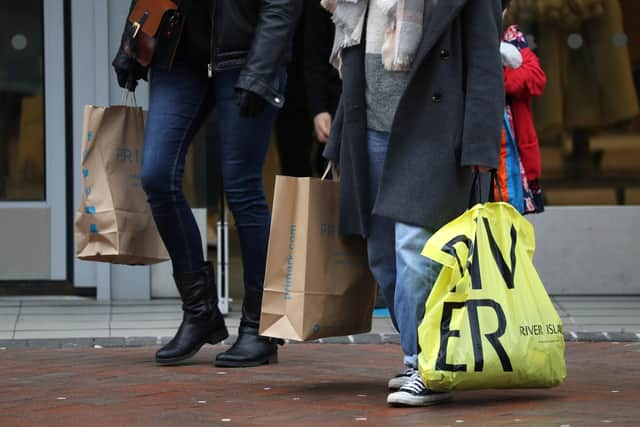Inflation UK: Rishi Sunak accused of 'utterly failing' as rate of inflation remains at 10.1%
The Office for National Statistics (ONS) revealed Consumer Prices Index (CPI) inflation fell to 10.1 per cent in March from 10.4 per cent in February. Nevertheless, it remained higher than experts had predicted as food and drink prices continued to soar.
Economists had forecast inflation would be 9.8 per cent for the month. The high level of inflation continues to keep pressure on the Bank of England regarding interest rates, with inflation still heavily above the 2 per cent target rate.
Advertisement
Hide AdAdvertisement
Hide AdThe ONS revealed food prices increased by 19.1 per cent year-on-year – the sharpest jump since August 1977. Bread, cereals and fruit prices increased, while the impact of vegetable shortages also continued to weigh on inflation.


Meanwhile, clothing and footwear prices rose by 7.2 per cent year on year, although this represented a slight slowdown against February’s data. Restaurant and hotel prices also continued to rise, at 11.3 per cent, but also saw inflation cool from the previous month.
Increases were partly offset by lower fuel costs, with petrol and diesel costs down 5.9 per cent against the same month last year after prices had spiked following Russia’s invasion of Ukraine.
SNP economy spokesperson Stewart Hosie said: “Inflation in the UK remains high compared to other major European nations because of Brexit. Combined with the UK predicted to have the worst growth of any major economy, the UK is on a downward spiral all at the hands of Brexit.
“There will be no cause for comfort from a pro-Brexit Labour government either as they would keep Scotland out of the European Union, a market seven times the size of the UK’s, and the economic turmoil would continue.”
Economists have predicted stubborn inflation will drop more sharply from April amid a decline in energy prices, although the continued price cap at £2,500 annually for a typical home means households will feel little change.
The UK fiscal watchdog, the Office for Budget Responsibility (OBR), last month cut its forecasts for inflation, predicting CPI would end the year at around 2.9 per cent.
Chancellor Jeremy Hunt said: “These figures reaffirm exactly why we must continue with our efforts to drive down inflation so we can ease pressure on families and businesses. We are on track to do this – with the OBR forecasting we will halve inflation this year – and we’ll continue supporting people with cost-of-living support worth an average of £3,300 per household over this year and last, funded through windfall taxes on energy profits.”
Advertisement
Hide AdAdvertisement
Hide AdKitty Ussher, chief economist at the Institute of Directors, said: “Business remains extremely concerned by the rate of inflation and wants to see it under control. While it is a relief that the headline rate of inflation is now pointing downwards again, following the surprise rise last month, the Bank of England’s job is not yet done.”
Martin Beck, chief economic adviser to the EY Item Club, said: “The club still thinks headline inflation will fall at pace this year, mainly reflecting strong base effects and falling wholesale energy prices, which should feed through into lower household bills from the summer.”
Comments
Want to join the conversation? Please or to comment on this article.